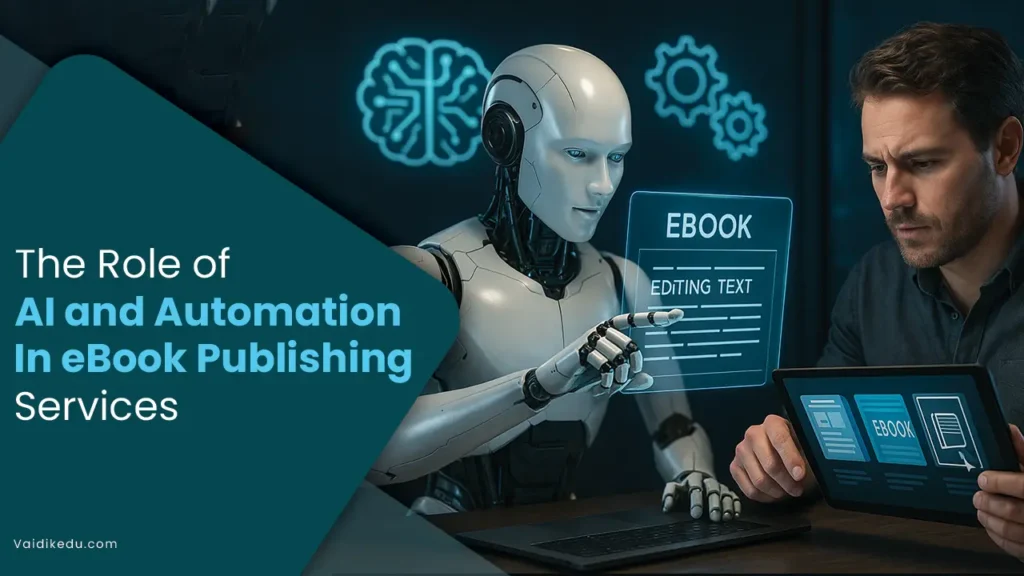AI is playing an increasingly pivotal role in digital publishing, revolutionizing how content is created, distributed, and consumed. Here are some key areas where AI is impacting the industry:
AI And Automation in E- Book Publishing Services
Content Creation And Generation
- Automated Writing: AI-driven tools can generate articles, reports, and even creative writing. For instance, news organizations use AI to quickly write short articles on topics like financial reports or sports scores, allowing journalists to focus on more in-depth reporting.
- Content Personalization: AI can tailor content to individual reader preferences based on their browsing history, behavior, and demographic information. This ensures that users receive content that is most relevant to them.
- Text Editing And Proofreading: AI-powered tools, such as Grammarly or Hemingway, help writers improve grammar, sentence structure, and style by providing real-time feedback and suggestions.
Content Curation And Discovery
- Recommendation Algorithms: AI algorithms power content recommendation systems on platforms like Netflix, YouTube, and news websites. These systems analyze user behavior to suggest articles, videos, or other forms of media, enhancing the discovery process and keeping users engaged.
- Search optimization: AI enhances search engines and website navigation by improving keyword analysis, understanding context, and delivering more accurate and relevant search results for users.
Audience Engagement And Marketing
- Personalized Advertising: AI enables hyper-targeted ad campaigns by analyzing user data and behaviors to predict what ads will resonate with individual users, leading to higher conversion rates and more efficient marketing.
- Chatbots And Virtual Assistants: AI-powered chatbots can assist readers with questions, provide personalized recommendations, or even guide them through purchasing subscriptions or products. They improve user engagement and automate customer service.
Content Distribution And Analytics
- AI-Powered Distribution: AI tools help publishers optimize when and where to post content based on audience behaviors and trends. These tools determine the best times to publish, how to segment audiences, and how to maximize reach.
- Performance Analytics: AI tools track how content is performing in real time, analyzing metrics such as page views, user engagement, and social media shares. Publishers can use these insights to refine their content strategy and improve future performance.
Visual Content Enhancement
- Image Recognition And Tagging: AI can automatically tag images with relevant keywords, making them easier to search and categorize. It can also generate captions for images or even edit them for aesthetic improvements.
- Video Editing: AI-driven video editing tools can analyze footage and automatically create edited versions, saving time for content creators.
Copyright And Plagiarism Detection
AI tools are increasingly being used to detect plagiarism, ensuring that content is original. Tools like Copyscape or Turnitin scan large amounts of content and flag potential copyright violations.
Localization And Translation
- Automated Translation: AI translation tools, such as Google Translate, are improving rapidly and help digital publishers translate their content into multiple languages, allowing them to reach a global audience with minimal effort.
- Cultural Adaptation: AI can help publishers adapt content to different cultural contexts, not just by translating language, but by understanding cultural nuances and adjusting tone, references, and imagery accordingly.
Streamlining Administrative Tasks
Administrative tasks such as royalty tracking, contract management, and payment processing can also be automated through AI-driven tools, reducing the workload for publishers and authors.
Predictive Analytics And Sales Forecasting
AI and machine learning algorithms help predict future sales trends by analyzing historical data, customer behavior, and market conditions. This helps:
- Sales Forecasting: Publishers can better anticipate demand and optimize inventory or digital rights management strategies.
- Author Revenue Estimation: Authors can receive more accurate insights into potential royalties, pricing adjustments, and sales strategies based on AI-driven analytics.
Customer Reviews And Sentiment Analysis
AI tools also assist in monitoring and analyzing customer feedback:
- Sentiment Analysis: AI-driven sentiment analysis tools can evaluate customer reviews and social media posts to provide publishers with insights into reader sentiment, highlighting both positive and negative trends. This helps authors and publishers improve future editions or adjust marketing strategies.
- Automated Responses: AI-powered chatbots and review management systems can automate responses to customer reviews, helping authors and publishers engage with their audience more effectively and efficiently.
Distribution And Sales
Automated Distribution: Platforms like Draft2Digital and Smashwords allow authors to distribute their eBooks to multiple retailers and libraries automatically, streamlining the process of getting books into the hands of readers.
Dynamic Pricing Models: AI can analyze market trends and reader behavior to suggest dynamic pricing strategies, allowing authors to optimize their book pricing for different regions or periods (e.g., discounting during special promotions).
Frequently Asked Questions
AI is used in various aspects of eBook publishing, including:
- Content creation: AI tools help generate or enhance content through writing assistants, grammar checkers, or even AI-generated text.
- Editing and proofreading: AI-powered tools assist in grammar, punctuation, style corrections, and detecting inconsistencies.
- Formatting: AI can automate the formatting of eBooks, adjusting for different eBook readers and file formats.
- Cover design: AI tools assist in designing eBook covers based on data-driven insights into what works well in the market.
- Personalized recommendations: AI algorithms suggest eBooks to readers based on past reading habits and preferences.
Automation plays a significant role in streamlining many processes in eBook publishing, such as:
- Conversion: Automating the conversion of manuscripts into various eBook formats (EPUB, MOBI, etc.).
- Metadata management: Automatically generating and managing metadata (such as keywords, categories, and tags) to optimize eBook discoverability.
- Distribution: Automating the distribution of eBooks to multiple platforms like Amazon, Apple Books, and Google Play Store.
- Sales reporting and analytics: Automation tools track eBook sales, downloads, and other performance metrics to provide insights.
While AI and automation are powerful tools, they are unlikely to fully replace human authors and editors. AI can assist in the writing and editing process but lacks creativity, emotional depth, and nuanced judgment. Human expertise is still essential for tasks that require originality, storytelling, and deep subject matter knowledge.









